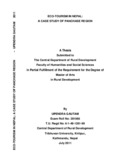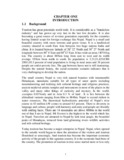Please use this identifier to cite or link to this item:
https://elibrary.tucl.edu.np/handle/123456789/3390| Title: | Eco-Tourism in Nepal: A Case Study of Panchase Region |
| Authors: | Gautam, Upendra |
| Keywords: | Tourism;Communication |
| Issue Date: | 2011 |
| Publisher: | Central Department of Rural Development |
| Institute Name: | Central Department of Rural Development |
| Level: | Masters |
| Abstract: | Tourism is the world’s fastest growing industry and being one of the hottest economic activities, leisure recreation is popular all over the world. It has affected almost every part of the world and Nepal is not an exception. Nepal is recognize as a tourist destination because of its unique nature beside cultural heritage and religious /traditional practices. Historical monuments and the sites of pilgrimage are sure to motivate tourists to visit Nepal at least once in life time . The concept of ecotourism started from Costa-Rica in 1987 by a Tour Operator . Principally ecotourism needs areas especially unspoiled natural areas. Ecotourism is a complex and multidisciplinary phenomenon and has a tremendous role to play in the interpretation of nature and natural resources, as well as in the understanding of human history and its interaction with the rural environment , and the diffusion of environments revealed that there knowledge and awareness. Ecotourism implies travelling to relatively undisturbed or uncontaminated natural areas with specific objective such as studying, admiring, and enjoying the scenery with its flora and fauna, as well as any existing cultural manifestations. Nepal as a naturally beautiful country having huge biodiversity contains great potentiality of ecotourism. Panchase area lies in the midhills of western development region. The area often reflected as Panchase region that consists of Panchase hill and its 15 adjoining VDCs of three districts. The region has a great biological, cultural and religious diversity and natural beauty as well. Panchase have sub-tropical to temperate environment, different forest types so it is contains one of the huge potential areas of eco-tourism in the country. It can be developed as a spot for ecotourism , orchid sanctuary and as a natural research laboratory due to its diverse vegetation and climate. The study based on primary data from 80 respondents: 35 local people, 20 hotel owners and 25 tourists has revealed that there is great potentiality of ecotourism and essentially of environmental conservation foe the sustainable income from tourism sector. To maintain the tourism business with future prospect the values and principles such as ‘Take only photographs leave only foot prints’ are essential to apply. The existed beauty of the place such heart- touching Himalayan ranges, cool fresh air, wide coverage on natural forest, orchid sanctuary is the key elements of ecotourism potentiality in this area. The study has found that tourists came to Panchase , 35 percent for sightseeing, natural resources 15 percent, cultural diversity 10 percent, pleasure environment and natural resources 11 percent, pleasure environment and people sanitation 8 percent, pleasure environment and cultural diversity 12 percent and others 9 percent for convention purpose. Open grazing is the major threats to the conservation of Panchase Regenerations of medicinal plants, which are mainly herbs, is severely affected by transhumance, fodder practices also render the natural growth of forest. The intensity of human impact is so immense that the forest near the settlement has transformed in shrub and bushy areas. Southern part of Panchase hill adjacent to Kaule, within altitude of 1850meter is completely denuded. Timber plants like Arupate and Champ are in verge of extinction. various medicinal plants are found on the forest of Panchase as Chiraito, Satuwa, Kurilo, Majithho, Vyakur, Lauth Salla etc. NTFPs like Daphne, Molo, Allo, Nigalo etc. holds good prospects for the establishment of small scale forest based micro enterprise. Inspite of huge potentiality of tourism in general and ecotourism in particular there are various constraints like poor transportation and communication facilities, poor recreational facilities, a limited season, lack of trained manpower, lack of marketing, poor solid waste management system limited number of educated people. Despite some constraints the future of ecotourism in Panchase is found to be very optimistic and relies heavily on who is responsible for marketing, setting the planning, initiating entry fees involving the locals and establishing the infrastructures. Conservations of cultural heritage, instruments rituals and getting further attention to develop it for pilgrimage tourists .Similarly, proper government plans and policies must be implemented to enhance the status of the Eco-tourism in Panchase. |
| URI: | http://elibrary.tucl.edu.np/handle/123456789/3390 |
| Appears in Collections: | Rural Development |
Files in This Item:
| File | Description | Size | Format | |
|---|---|---|---|---|
| Cover.pdf | 43.35 kB | Adobe PDF |  View/Open | |
| Chapter.pdf | 503.17 kB | Adobe PDF |  View/Open |
Items in DSpace are protected by copyright, with all rights reserved, unless otherwise indicated.
